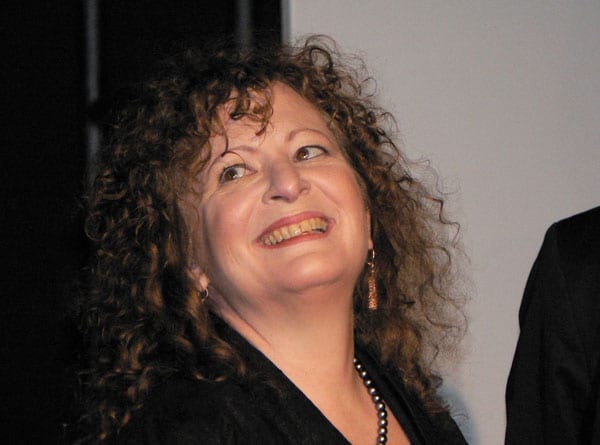
February 9, 2019; Hyperallergic
Just like last year, the telltale orange prescription bottles lay scattered across the floor, child-locked lids giving the barest of nods to the danger of their contents. Just like last year, large banners unfurled across the space, the guerrilla display in the middle of the room pulling viewers away from the carefully curated ones on the walls. And like last year, the Metropolitan and Guggenheim museums have kept the Sackler family’s name on their galleries, so Nan Goldin and her group, Prescription Addiction Intervention Now (PAIN), made both museums a site of protest.
“We will come back every year until something happens. Until they disavow themselves,” said Goldin. Last year, PAIN staged their protest in the famous Temple of Dendur, which is in the Sackler wing.
Goldin and her group want the Sackler name removed from the galleries and for the museums to publicly disavow relationships with the Sacklers and refuse to accept further donations. Her petition on change.org, which has 40,000 signatures, calls for the Sackler family to fund rehabilitation, reeducation, and Narcan distribution, among other things.
As most nonprofits now know, the Sackler family runs Purdue Pharma, the manufacturers of OxyContin, a drug whose over-prescription is widely seen as having fueled the opioid epidemic which, between 1999 and 2017, has killed nearly 400,000 people. Thanks to a Massachusetts lawsuit, the public recently learned that the Sacklers not only manufactured and sold this drug in preposterous quantities, but they pushed its over-prescription and laid the blame for addiction at the feet of addicts. NPQ’s Steve Dubb, who has been following the Sackler saga, explained, “Emails cited in the complaint show members of the Sackler family engaged deeply in company operations.” This is with the exception of Elizabeth Sackler, the daughter of Arthur, who died before the OxyContin mega-marketing really took off. Elizabeth Sackler has said she supports Goldin and PAIN.
This year, PAIN started at the Guggenheim with the banners, pills, and what they called a “die-in,” where protestors laid on the floor. Mock prescription pads quoted Richard Sackler’s exchange with Robert Kaiko, the developer of OxyContin. Kaiko worried about OxyContin’s potential for abuse, and Sackler wanted to know, “How substantially would it improve our sales?”
Sign up for our free newsletters
Subscribe to NPQ's newsletters to have our top stories delivered directly to your inbox.
By signing up, you agree to our privacy policy and terms of use, and to receive messages from NPQ and our partners.
Protestors also draped banners from the railings in the Guggenheim’s signature spiral atrium that read, “400,000 dead,” “Shame on Sackler,” “200 dead each day,” and “Take down their name.”
After the event in the Guggenheim, which was covert, the protestors marched down to the Metropolitan Museum of Art, a plan they had publicly announced. At the Met, they stood on the steps and gave speeches.
Alexis Pleus, who lost her teenage son to OxyContin, said, “I don’t expect the Sacklers to care about my son Jeff. I don’t expect the legislators to care about my son Jeff. But 40,000 lives? Somebody should care about that.”
A few weeks ago, after the Massachusetts lawsuit brought the family’s involvement to light, the Met agreed to reexamine its gift policy but did not commit to any other action. Daniel Weiss, president and CEO, said,
The Sackler family has been connected with The Met for more than a half century. The family is a large extended group and their support of The Met began decades before the opioid crisis. The Met is currently engaging in a further review of our detailed gift acceptance policies, and we will have more to report in due course.
The Guggenheim has not yet responded.—Erin Rubin













